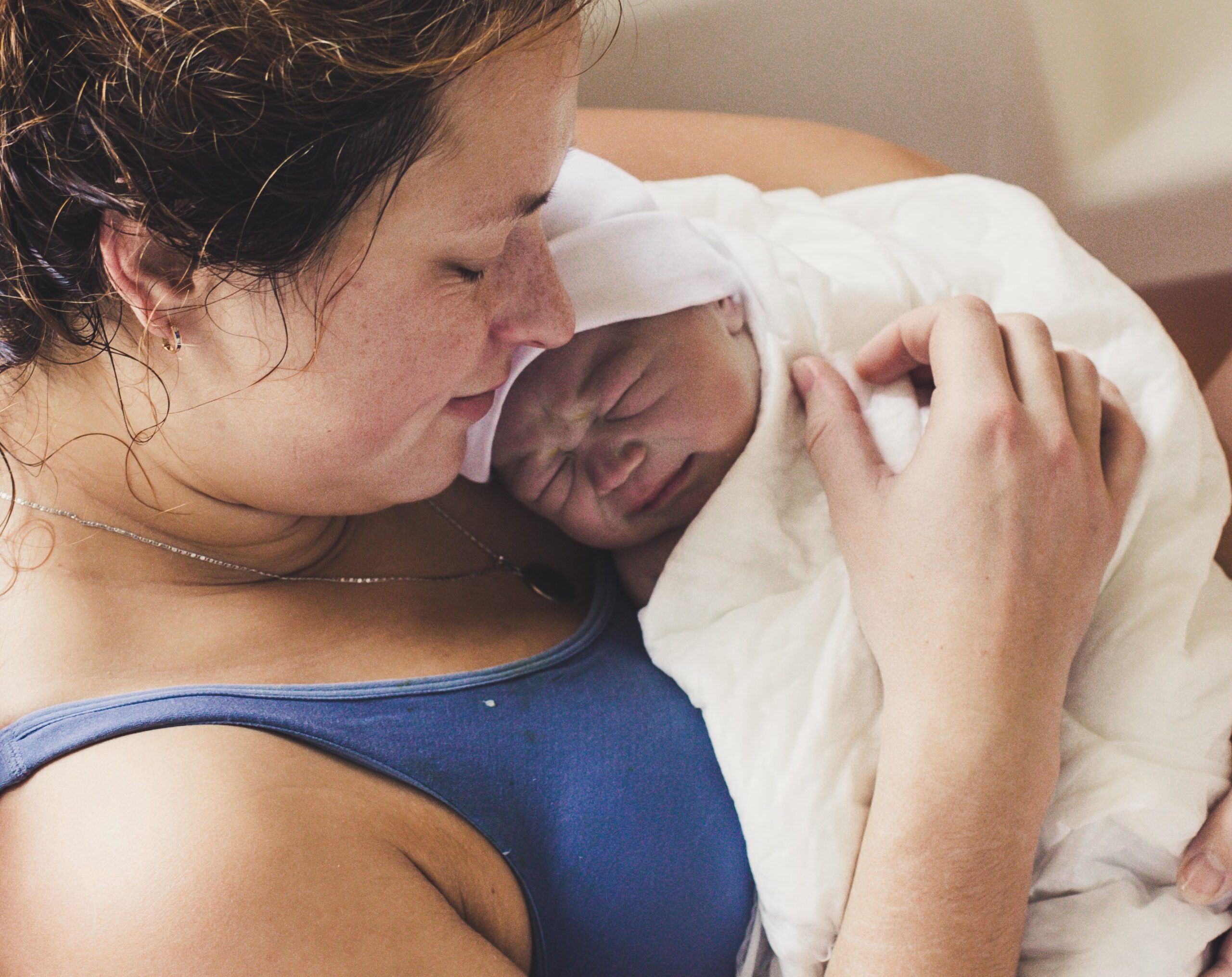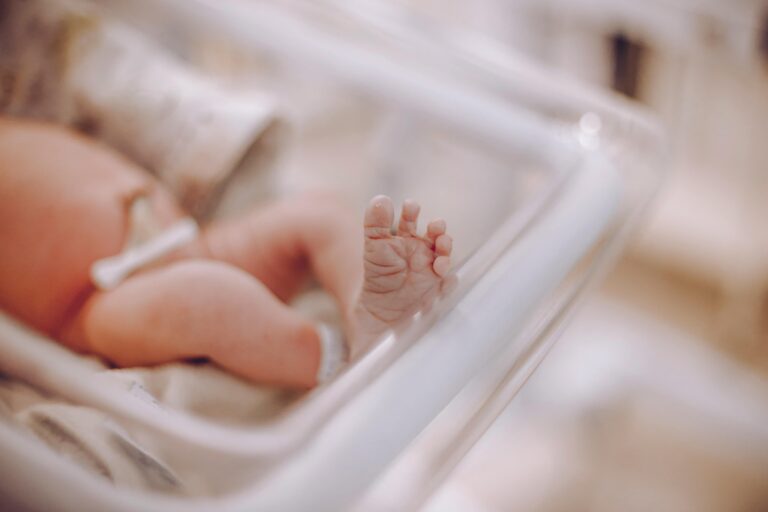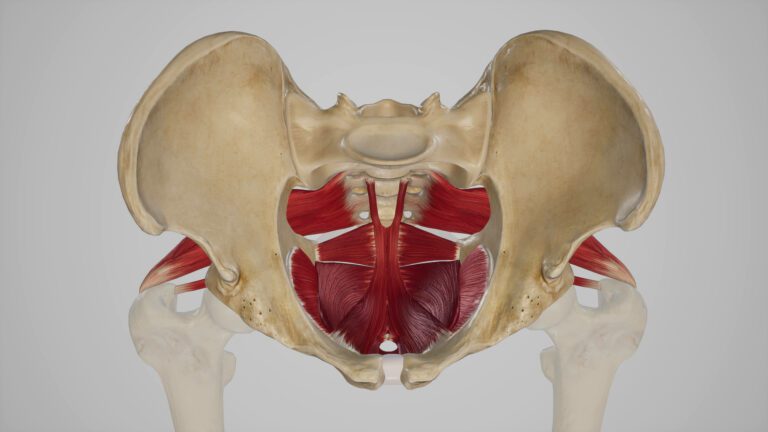Epidural vs. Natural Birth: Which Should You Choose?
When I prepared to give birth to my first daughter, I thought getting an epidural was a no-brainer. In my mind, anyone who wanted to feel the pain of childbirth was crazy. I spent little time researching anything related to birth and instead spent all of my time preparing to bring my new baby home from the hospital.
However, after I received my epidural, I still had a very challenging birth. My eyes were opened to the fact that there is no easy way of giving birth despite my previous thoughts. I began to research natural childbirth and chose to go that route for my second child’s birth.
Options When Giving Birth
There is no right or wrong way to give birth. Each mom has to consider her unique situation and preferences. However, I highly recommend that you educate yourself on all of your options. If you have researched all the possibilities, you will be much less caught off guard if things do not go as planned during labor. I have had both a medicated and unmedicated birth, so I can offer both the positives and negatives of choosing either one. (Listen to my two birth stories on The Mamastefit Podcast to hear more details about my personal experiences.)
To help you decide which type of birth you would like to have, read the pros and cons listed below.
Disclaimer: I acknowledge that not everyone can have an unmedicated birth or avoid interventions in the hospital. I am thankful that we live in a country with great health care and access to modern medicine. The information below is mostly applicable to low-risk, healthy pregnancies.
What is an Epidural?
An epidural is a form of anesthesia in which an injection is placed in the mother’s back. It is a sterile procedure. When working properly, it significantly reduces pain or fully numbs the lower half of the body.
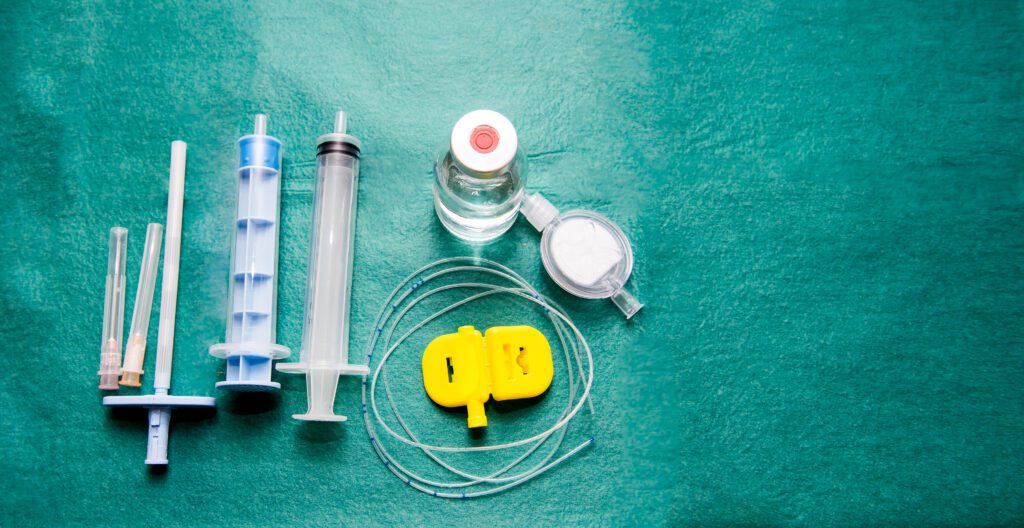
Pros of Getting an Epidural
Pain Relief
The most obvious benefit of receiving an epidural is pain relief. When an epidural works correctly, the mother feels little to no pain. She may feel completely numb or feel sensations of pressure. The mother may or may not feel pain when pushing.
I personally did not feel any pain when I pushed, but I did still feel some pressure. Feeling pressure allowed me to still feel connected to the birthing process while I pushed.
Promotes Relaxation
When a mother experiences little to no pain during labor, her body can relax, and she might even be able to sleep. This is particularly beneficial in long labors or labors where the mother is exhausted or overly stressed. Stress can make it much harder for the cervix to stretch and open, which is necessary for the baby to be born. In such cases, an epidural can help an exhausted or stressed mother speed up labor or overcome labor stalls.
Little to No Preparation Needed
It is less time-consuming and requires less effort to prepare for a medicated birth as compared to an unmedicated birth. Although the mother should still research and prepare for self-advocacy and her birth plan preferences, she does not need to spend as much time preparing for pain management techniques such as counterpressure and hypnobirthing. If a mother is feeling overwhelmed or busy or is a single parent, choosing to have an epidural in advance can help to alleviate her mental stress.
Conscious During a C-section
In the event of an emergency C-section in which the mother has already received an epidural, she can be administered strong pain medication through the same catheter. This will allow her to remain conscious during the birth of her baby. However, if the mother doesn’t have an epidural and needs to be quickly taken for a C-section, she will likely be given general anesthesia and be put to sleep. It is comforting to know that if an epidural is already in place, the mother can be awake during a C-section if necessary.
Cons of Getting an Epidural
Risk of Injury
Like any other medical procedure, there is a risk of injury associated with epidurals. The risks can range from lasting backaches to nerve damage, severe headaches, and more. Although the likelihood of such issues occurring is low, a risk is still involved. I had a positive experience with my epidural, but unfortunately, I know multiple women who have experienced lasting pain and injuries from their epidurals.
Possibility of it Failing
Many women are not aware that epidurals may not always work or they may only work on one side of the body. This is why I always encourage mothers to research and practice pain management techniques and labor positions, even if they plan to get an epidural. While I was fortunate that my epidural worked, I had no backup plan if it had failed. It’s important to understand that epidurals are not always the perfect solution for pain relief during labor.
Limited Time Window
There is a limit on how early a woman can get her epidural. Different hospitals have their own rules on how dilated a woman must be before she can get her epidural. I went to the hospital thinking I could get mine right after my induction began. False! Little did I know that my hospital’s rules were that my water had to break first (which I now find strange since my water didn’t break until I was pushing during my second labor…).
Doctors also often limit how late into labor a mother can receive an epidural, typically around eight to ten centimeters dilated. This is because there may not be enough time to administer the epidural once the mother is closer to the pushing stage. Sometimes, mothers experience precipitous (very fast) labor and arrive at the hospital closer to the pushing stage, leaving them ineligible to receive an epidural.
Limited Mobility
When a woman receives an epidural, the anesthesia causes numbness in the lower half of her body, which restricts her ability to move that part of her body. As a result, the mother cannot get out of bed for any reason. This limits the different pushing positions that can be attempted during childbirth to resting and lying positions. This also prolongs the time that the mother needs to stay in bed after delivery because she must wait until the numbness wears off.
Labor May Last Longer
During labor and delivery, epidurals may slow down the process because the mother is lying down and working against gravity. When lying down, the baby’s head may not push on the cervix as much, and the mother cannot easily move into different positions that could help open the pelvis. This can result in stalled or slowed labor. On the contrary, it is possible that receiving an epidural can help progress labor if the mother was stressed and tense before. It really does depend on each unique situation.
Might Cause Blood Pressure to Drop
Epidurals can often cause a drop in blood pressure in the mother. This can result in the mother feeling nauseous and/or lightheaded. In such cases, nurses will administer fluids in the mother’s IV and ask her to lie on her side to improve circulation and combat these symptoms. I experienced a drop in blood pressure after receiving my epidural, which made me feel sick, extremely tired, and like I was going to pass out.
Effects on the Baby
It’s important to note that a small amount of the epidural medication does reach the baby during labor. Plus, if the mother experiences a drop in blood pressure, this can cause the baby’s heart rate to slow down. Before my epidural, my baby’s heart rate was already decelerating with each contraction. After the epidural, her heart rate dropped dangerously low, which was very scary. Fortunately, everything turned out fine.
Pushing Might be Difficult
Although some women may still experience pain with epidurals, many do not. Feeling numb during pushing may cause the mother to feel unsure or confused about how to push. In these cases, coaching from a nurse and using a mirror can help her push effectively.
I was feeling a bit unsure of myself when it was time for me to push, partly due to the numbness and partly because the nurse told me that I was not pushing correctly. She coached me through her preferred method of pushing, and after an hour, my baby was born. Although her technique was effective, I didn’t appreciate feeling unsure of myself in the moment.
Natural Birth
A natural birth is when a mother gives birth vaginally without any medication. The pros and cons discussed below mainly refer to when a mother plans to have a natural birth ahead of time. If she wanted an epidural and was not given the pain relief she hoped for, she may feel feelings of trauma, overwhelm, etc., instead of positive feelings toward her birth.
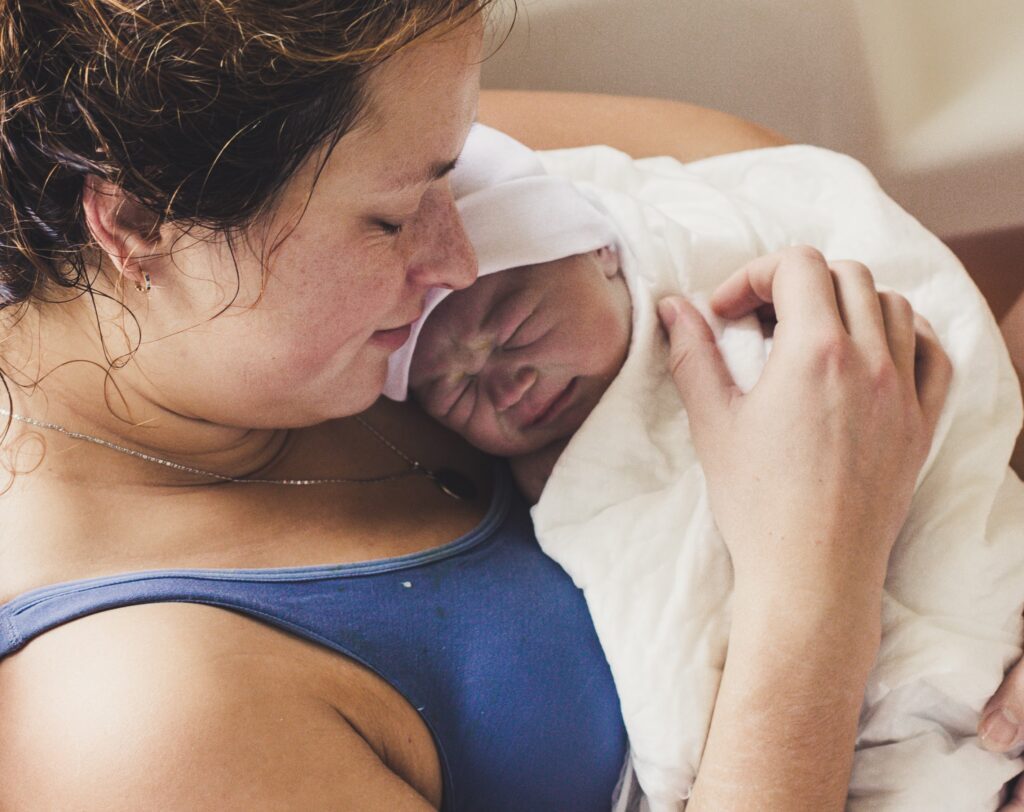
Pros of a Natural Birth
Ability to Change Positions
During natural childbirth, the mother is free to change positions as she goes through labor and delivery. She can move around to find the positions that bring her the most pain relief and help her baby move through the birth canal. Changing positions also makes it easier for her partner to provide counterpressure to support her. The mother can choose to give birth in a position other than lying in bed, such as using a tub, birthing stool, or being on hands and knees. I personally found it helpful to walk during my labor, move around in the tub, and have my husband apply counterpressure to my lower back. All of these movements were made possible by my mobility.
Potentially Faster Birth
When a mother is able to move around during labor and delivery, it can often result in a faster birth because gravity works in favor of both the mother and baby. The baby’s head can help push on the mother’s cervix, which aids in dilation, and gravity can also assist in helping the baby to be born more quickly. For instance, during my natural birth, I pushed on my knees while holding onto the side of the tub, which helped me to deliver in just sixteen minutes. It’s important to note, however, that this isn’t always the case. The length of the labor can be affected by the baby’s position and the mother’s stress level, among other factors.
Mental Clarity
When a mother gives birth without medication, she is able to stay more mentally alert. This helps her to be present during the birthing process, fight through any pain she may feel, and use any coping mechanisms she has practiced. As a result, she is able to remember more of the birth experience with a clear mind. It is important to note that pain can also make it challenging to focus, so it’s crucial to communicate your birth plan and have support during your delivery. Even though I was in my own world while pushing during my natural birth, I was still more mentally present than in my first birth when my epidural caused my blood pressure to drop, making me feel loopy.
Fewer Interventions Needed
The process of giving birth is a natural and physiological one. When this process is allowed to occur without interference, additional interventions are usually less needed. However, when a low-risk and healthy birth is interrupted by medical interventions, such as medication, there may be unintended side effects. To combat these side effects, more interventions may be required, with the most extreme intervention being a C-section. When a mother chooses a natural birth, the cascade of interventions is never begun.
Healthier Heart Rate for Baby
Without medicine entering the baby’s body and without the mother’s blood pressure as likely to drop, chances are higher for the baby’s heart rate and other levels to be healthier than in a medicated birth. During my natural birth, my baby’s heart rate was perfectly healthy every time it was checked.
Partner Involvement
In a natural birth, the mother’s partner is able to play a more active role in supporting her. Her partner can support her by helping her advocate for herself, providing encouragement, giving physical support like counterpressure or applying hot or cold therapy, and much more. In my case, my husband and I learned counterpressure techniques from the Mamastefit third trimester on-demand series, which ended up being my favorite pain management technique I used. It was a very meaningful experience for us to work together to welcome our daughter into the world.
Mobility After Birth
I often hear that natural birth leads to a faster postpartum recovery. However, this was not the case for me, as I had a bigger second baby and experienced a much slower recovery. Nevertheless, it is true that after a natural birth, the mother is not numb, so she can walk immediately. Fortunately, I was sent home only hours after giving birth as opposed to staying in the hospital for a day or two. As soon as we arrived home, I was even able to carry my newborn in to meet my toddler on the same day I had given birth. It was a precious memory!
Positive Feelings Associated with the Birth
After giving birth naturally, many women feel empowered and experience a sense of euphoria. The feeling of accomplishing something incredibly difficult in exchange for the priceless and beautiful reward of holding your child for the first time is both satisfying and rewarding. I myself felt this way, although it was not my primary reason for choosing a natural birth. I also experienced less of a hormone crash and didn’t suffer from baby blues. However, this may not be the case for every mother, as baby blues and postpartum depression can occur after either type of birth. Nevertheless, there is indescribable peace and joy that comes with allowing your body to do what it is naturally designed to do without any interference in the process.
Bonding with Baby and Breastfeeding Success
Research shows that women who give birth naturally tend to bond more easily with their babies and are more likely to breastfeed successfully. In medicated births, interventions such as pitocin or emergency C-sections may be necessary, which can interfere with the release of oxytocin, a hormone that helps with bonding and milk production. However, it’s important to note that having an epidural doesn’t necessarily mean the mother will have a weaker bond with her child or an inability to breastfeed. Traumatic childbirth experiences can happen regardless of whether the birth was natural or medicated and may impact bonding and breastfeeding.
Cons of a Natural Birth
Pain
Although some women claim not to experience pain during natural childbirth, most women who have had a natural birth will honestly admit that it hurts a lot. However, mothers who are motivated to have a natural birth for their own personal reasons are also more motivated to learn helpful coping techniques. One does not necessarily need to have a high pain tolerance to prepare to handle the level of pain associated with natural childbirth. They only need to prepare ahead of time.
The contractions I experienced during my natural birth were less painful compared to my medicated birth for a few reasons. Firstly, the contractions were not altered by pitocin and were not as intense. Secondly, I had changed my mindset and welcomed the pain as it meant I would soon meet my baby. Thirdly, I could move my body and use coping techniques like counterpressure. Additionally, I only pushed for sixteen minutes. Therefore, while there was intense physical pain, it lasted for a short time and was much more manageable with the right preparation.
Need to Prepare
I would never suggest natural birth to a mother who is unwilling or unable to prepare for it. Natural birth is not something to enter into lightly due to the high demands it puts on the mind and body. For some women, the need to prepare can be a negative if they are under a lot of stress, have limited free time, are busy single mothers, or have other challenges. However, there is a lot of information available to help women learn how to cope with the pain of labor, both physically and mentally, if they are willing to learn.
No Turning Back
When a woman is around eight to ten centimeters dilated, and especially when the baby is crowning, she may be informed that she no longer has the option to receive an epidural due to the lack of time. Once she begins to push, she may regret her decision and wish that she had opted for the epidural. To avoid this situation, I recommend committing to a natural birth well before going into labor and learning coping techniques that work for you.
Support is Necessary
It is not recommended that mothers go through natural birth without any support. Feeling supported during birth is proven to help the mother have positive feelings associated with her birth and help her follow through with her wishes of not receiving an epidural. If you do not have someone close to you who can be there to provide physical and emotional support during your birth, such as in situations where your spouse is deployed or deceased, or if you are unable to hire a doula, then natural birth may not be the best option for you.
Bottom Line
There is no single correct way to give birth. Each birth experience is unique and not a black-and-white situation. It is important to take the time to consider your individual situation, personality, and available support before deciding on the style of birth that is best for you. The points mentioned above do not apply to all births and should not be considered blanket statements. Birth is a deeply personal and sacred experience; going into it with knowledge of your options, an understanding that you cannot control every outcome, and a supportive provider will help ensure you have a positive experience.
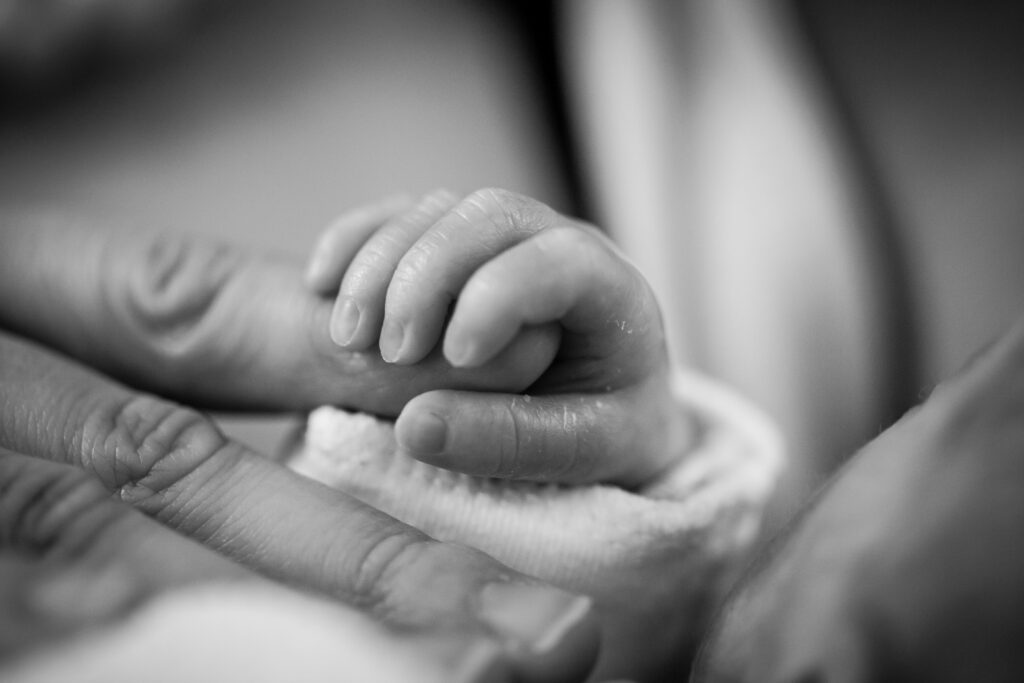
Conclusion
I gave birth to my second daughter in the tub at a free-standing birth center while my husband applied counterpressure to my lower back. He caught my daughter in the water and quickly passed her to me on my chest. Her heart rate had been completely healthy the whole time, giving me a deep sense of peace throughout my entire labor. Feeling the love and support of my husband, midwives, and mom while feeling the pain relief of the water and the peace in the room led to the most empowering experience I could’ve asked for (although there may have been a little screaming while I pushed). Holding my daughter on my chest felt like I had overcome the world to meet her sweet soul. I wouldn’t trade that feeling for anything.
If I were to have a third birth, I would choose a natural birth again. I hope my experience and the information above help you decide what kind of birth you want. Comment below any additional pros and cons of epidurals or natural births that you have. Did you have a positive or negative birth experience? Let us know in the comments or email me. I would love to hear your story!

